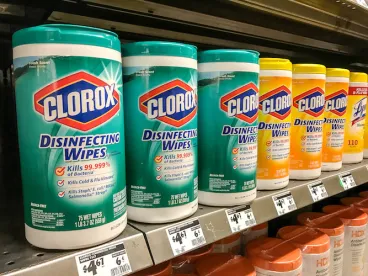By January 1, 2020, the California Cleaning Product Right to Know Act (California RTK Act) will require manufacturers of certain covered cleaning products to make extensive ingredient disclosures on their company websites. By January 1, 2021, the California RTK Act will require ingredient disclosures on product labels.
Meanwhile, the New York Department of Environmental Conservation (DEC) cleaning product disclosure program has stalled. On August 27, 2019, the New York State Supreme Court invalidated DEC’s Household Cleansing Product Information Disclosure Program on grounds that the agency did not follow proper rulemaking procedures. DEC has announced its intent to formally propose regulations on cleaning product ingredient disclosures in “the near future.”
Which Products Are Covered By the California RTK Act?
The California RTK Act applies to:
-
General cleaning products (e.g., soaps and detergents to clean or otherwise care for fabric, dishes, counters, and appliances).
-
Polish or floor maintenance products.
-
Certain air care products (e.g., indoor air fresheners).
-
Certain automotive products (e.g., cleaning, polishing, or waxing products for the exterior or interior of automobiles).
The law does not apply to:
-
Food.
-
Drugs.
-
Cosmetics (including personal care items such as shampoo, hand soap, and toothpaste).
-
Industrial products specifically manufactured for, and exclusively used in certain industries.
What Is Required By January 1, 2020?
Manufacturers of covered products sold in California on or after January 1, 2020, must disclose an extensive set of information for these products on their company websites. Generally, all intentionally added ingredients must be disclosed (with certain exceptions, e.g., for ingredients that meet the definition of “confidential business information” in the law), as must any of 34 substances listed in the law if they are present at or above 100 parts per million, whether intentionally or not. Manufacturers’ websites also must contain additional information, for example, Chemical Abstract Service numbers, the purpose of certain ingredients (e.g., fragrance, color, etc.), certain regulatory information, and links to safety data sheets. There are specific provisions on the disclosure of fragrance ingredients and allergens, and ingredients that are listed under California Proposition 65 are generally not required to be disclosed on websites until January 1, 2023. These disclosures must be available on websites in a place that complies with accessibility requirements and must be in an electronically readable format.
What Is Required By January 1, 2021?
Product label disclosures will be required for covered cleaning products sold in the state on or after January 1, 2021. However, products will be deemed in compliance with the California RTK Act if they display a date of manufacture or a date code indicating manufacture prior to this date. More detail regarding the substance of the California RTK Act label requirements can be found in our prior alert here.
Key Considerations and Challenges
Due to the complexity of the questions surrounding these disclosures, manufacturers should be working to gather and prepare the relevant information now. The following key considerations and challenges warrant special attention:
-
Protection of confidential business information and trade secrets.
-
Identification of the entity that will be the “manufacturer” for purposes of the law’s disclosure requirements, which is either the actual producer of the cleaning product or the private label entity/brand for which the product is made (as reflected on the label).
-
Outreach to suppliers to gather composition information and, as appropriate, identify generic names for ingredients to be withheld as confidential.
-
Review of ingredients against the 22 dynamic “designated lists” of chemicals of concern in the law (ingredients on these lists cannot be withheld as confidential, and trigger special requirements for website disclosures).
-
Ensuring availability of ingredient disclosure information to California employers in an “easily printable format” as required under the Labor Code revisions (made in conjunction with the passage of the California RTK Act).
-
Establishing processes for ongoing monitoring of disclosures (once published on websites) to ensure any necessary updates are made within the timelines specified in the law.
Timely compliance is critical. Cleaning products within the scope of the California RTK Act that do not comply with the online or label requirements once they take effect will be prohibited from being sold in California.
Update on New York Cleaning Product Disclosure Program
New York DEC adopted its Household Cleansing Product Information Disclosure Program in 2018, which was similar in some ways to the California law but contained significant variations that would have complicated disclosures for manufacturers of products covered by both programs. More detail regarding the substance of the New York disclosure program can be found in our prior alert here. The rollout of the New York program in 2018 immediately drew criticism from the regulated community on grounds that DEC had not followed a robust stakeholder process, had not sufficiently addressed the need to protect confidential business information, and had failed to align with California’s requirements. It also spurred a lawsuit which led to a key court decision. On August 27, 2019, the New York Supreme Court (a trial court) held the New York RTK Policy null and void on the ground that DEC did not comply with the state Administrative Procedure Act (deeming the “Policy” to be a “rule” that should have undergone formal notice and public comment). DEC has made it clear that the agency intends to begin a rulemaking on cleaning product ingredient disclosures, which will likely take at least a year to finalize.
California and New York Initiatives Part of a Broader Trend toward Comprehensive Ingredient Disclosures for Consumer Products
Other U.S. states as well as Congress have considered and may decide to pursue similar cleaning product disclosure initiatives. These initiatives are consistent with a broader emerging trend to require ingredient transparency in a variety of consumer products. New York, for example, recently became the first state to enact legislation requiring ingredient disclosures for feminine hygiene products, which will enter into effect in 2020 with disclosures required by 2021. California and Rhode Island have also recently considered enhanced ingredient disclosure requirements for cosmetics. Information, once disclosed, can become a point of leverage for consumers, NGOs and other stakeholders seeking to influence the transition to “safer alternatives” and away from perceived chemicals of concern. Companies up and down the supply chain and across industry sectors should be monitoring these initiatives to ensure that they can meet any emerging regulatory requirements and that they are prepared for input from external stakeholders.






 />i
/>i

